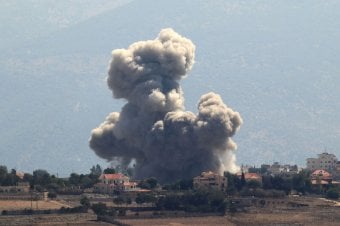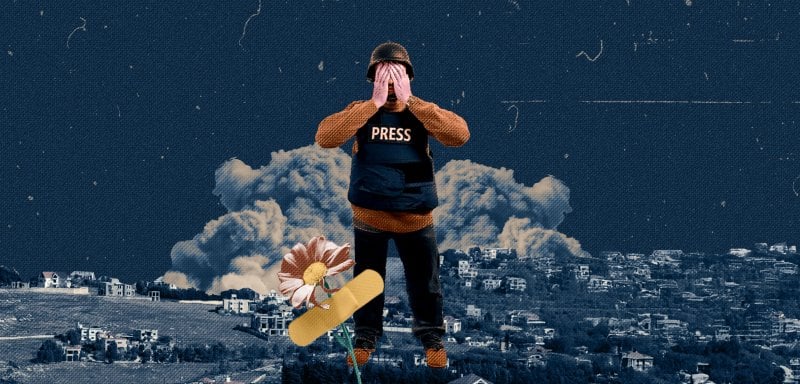On September 23, 2024, Lebanon witnessed a violent military escalation following heavy attacks by the Israeli military. This prompted Lebanese media outlets to mobilize their reporting teams to cover the events and relay the truth from the hardest hit areas, particularly in the South.

Israeli airstrikes on South Lebanon
Israel carried out more than 1,000 airstrikes across the country on the first day alone, killing hundreds and injuring thousands, according to Human Rights Watch. The Lebanese Ministry of Health announced on November 24, 2024, that the number of casualties since October 8, 2023, had reached 3,768 killed and 15,699 injured.
In addition to the human toll, the conflict triggered mass internal displacement, especially from the southern regions, the Beqaa Valley, and even some neighborhoods of Beirut that were subjected to intense bombing and constant threats.
What challenges do journalists face in dangerous zones during wartime, with Israel’s war on Lebanon as a case study? And how have they responded to these challenges?
During the Israeli war on Lebanon, journalists in the country faced a double challenge: fulfilling their professional duty of reporting the truth while confronting the life-threatening dangers surrounding them.
Between professional duty and fatal risks
During the Israeli war on Lebanon, journalists in the country faced a double challenge: fulfilling their professional duty of reporting the truth while confronting the life-threatening dangers surrounding them.
Media coverage was not just a professional mission, but a real test of resilience in the face of fear and death – particularly as Israel directly targeted journalists in blatant violation of international law.
On October 13, 2023, an Israeli airstrike targeted a group of journalists, killing Reuters cameraman Issam Abdallah, 37, and seriously injuring Agence France-Presse (AFP) photographer Christina Assi, 28. This incident sparked widespread condemnation from human rights organizations.
Throughout the Israeli war on Lebanon, Israel targeted 25 media workers – 13 journalists and 12 photographers – killing 9 and injuring 16 others, according to the Samir Kassir Foundation.
“I would allow myself to break down briefly in my car, away from the public eye, before returning to the field with a frozen face and unyielding resolve.”
Reporting through a war
With Israel’s repeated and direct targeting of journalists, a state of fear took hold and left a lasting psychological impact on many in the profession. Still, journalists in Lebanon insisted on doing their job and reporting from the front lines.
The death of Issam Abdallah had a deep impact on his colleague Marwa Ballout, who shared how she found herself in the midst of a psychological battle between grief, fear, and her determination to continue her professional mission.
“I wasn’t working with an official media institution, and rather chose freelance journalism through my collaboration with The Legal Agenda,” said Ballout. “This gave me freedom of movement and expression, but deprived me of any security cover or institutional support as the shelling and aggression intensified.”
While reporting on stories of displaced people and families of the missing, Ballout witnessed scenes that, she said, surpassed human endurance. Still, she decided to use her pen as a tool to stand with the victims and amplify their voices.
“I would allow myself to break down briefly in my car, away from the public eye, before returning to the field with a frozen face and unyielding resolve.”
Despite the announcement of a ceasefire, Ballout continued to follow up on unresolved cases, particularly those concerning the missing and displaced families.
“I didn’t have time to grieve – journalism is not just a profession; it’s a responsibility toward truth and justice.”
Lebanese journalist Marwa Ballout
“Fear wasn’t an option, but I was always on high alert, aware that journalists weren’t just observers – they were targets too.”
For his part, journalist Edmond Sassine recounts the challenges he faced while covering the war, as he had to constantly balance reporting the news quickly with ensuring his own safety and that of his team.
“Fear wasn’t an option, but I was always on high alert, aware that journalists weren’t just observers – they were targets, too. The hardest moment wasn’t the bombing or the destruction; it was the news of my colleague Issam Abdallah’s martyrdom. It was a clear message that Israel does not distinguish between journalists and civilians.”.
Lack of psychological support amidst timid initiatives
Media institutions in Lebanon suffer from a lack of psychological support for their journalists, despite their constant exposure to trauma. Sassine affirms that local media outlets do not provide their journalists with programs for psychological support, stressing the importance of collaboration with specialized organizations to offer this kind of care, especially for field reporters who bear immense psychological burdens.
In this context, Reporters Without Borders (RSF) played a key role in offering guidance to journalists working in conflict zones, emphasizing that psychological support must be a core component of comprehensive safety measures.
Amid this void, some organizations have stepped up efforts to support journalists. The Samir Kassir Foundation, for example, has offered several forms of assistance, including psychological support sessions and specialized training in conflict reporting and coverage, benefiting 129 journalists. The foundation emphasized the need for media institutions to pay attention to journalists’ safety frameworks and support mechanisms, including providing psychological care.
“The psychological pressure journalists face is no less dangerous than physical threats. Some experience breakdowns after witnessing bombings and massacres… Psychological care is not a luxury, but a necessity to ensure journalists can continue their work without trauma affecting or compromising their performance or personal lives.”
The Maharat Foundation also provided financial aid to a group of journalists affected by the war, in addition to psychological support sessions for dozens of journalists and media workers who had endured long and difficult periods during the war. These efforts were carried out in collaboration with the Beirut Press Freedom Centre (affiliated with Reporters Without Borders) and the IDRAAC Center.
The Alternative Press Syndicate collective also offered free psychological support to journalists by partnering with organizations such as CPRM, which provided support sessions to around 25 journalists. The collective also helped build a network for both professional and psychological protection, and launched awareness campaigns through video content highlighting the importance of mental health care for maintaining journalists’ professional balance and continuity.
Journalists at the heart of the psychological battle
Remie el-Zir, executive director of CPRM, believes that although journalists are not combatants, they are “at the heart of the front line,” which makes them in urgent need of ongoing psychological support. “The center began by offering free sessions, but the demand increased as the conflict escalated, prompting an expanded partnership with the Alternative Press Syndicate collective to ensure the continuity of this support.”
El-Zir points out that “the psychological pressure journalists face is no less dangerous than physical threats. Some experience psychological breakdowns after witnessing bombings and massacres,” stressing that “psychological care is not a luxury but a necessity, to ensure journalists can carry on their work without trauma impacting or compromising their professional performance or personal lives.”
Media coverage during the Israeli war on Lebanon was not just a professional mission, but a real test of resilience in the face of fear and death – particularly as Israel directly targeted journalists in blatant violation of international law.
The violence journalists face is not limited to field coverage and on-the-ground reporting. Cyber violence has also affected their mental health during their work. A survey conducted by the Maharat Foundation with a sample of 21 female journalists found that 24% said that online violence limited their ability to report freely.
This survey was part of a report on public policies that support women’s right to protection from cyber violence. It revealed that 72% of participants had experienced online violence, highlighting the prevalence of the phenomenon and its significant impact on female reporters.
The report concluded with a set of recommendations aimed at strengthening protection mechanisms against online violence on digital platforms.
Remie el-Zir, executive director of CPRM
Responsibility of media institutions and government bodies
Experts emphasize that a free and independent press requires journalists who are in good psychological health in order to perform their work objectively and efficiently. However, media institutions continue to fall short in this regard, leaving journalists to face the aftermath of covering conflicts alone and without any support to help them cope with trauma.
Despite some limited efforts by rights organizations and unions, the absence of psychological support remains a serious gap in Lebanon’s media environment.
“The government is keen to include the issue of public freedoms – including media freedoms – as a core part of its ministerial statement,” Lebanese Minister of Information Dr. Paul Morcos told Raseef22. “This is a clear indication that the government places special importance on the matter.
“On the other hand, it is not possible to delve into specific details within the ministerial statement, as it is a general policy outline for the government, which is tasked with addressing each issue in dedicated sessions.
“The protection of journalists during armed conflicts is enshrined in the four Geneva Conventions of 1949 and their 1977 Protocols, all of which the Lebanese government is committed to and seeks to uphold across all sectors. Therefore, the protection of journalists should not be limited to times of conflict, but must extend to all times, as journalists are inherently a high-risk group, necessitating providing them with constant protection.”
Marcos is currently following up on the new media law proposal submitted to the Lebanese Parliament. The law reaffirms key principles, particularly support for journalist protection, and emphasizes the importance of media freedom. Protecting journalists is an essential component of these freedoms, according to Minister Morcos, .
“The testimonies of journalists who covered the war on Lebanon reveal the immense challenges they face – not only in terms of physical safety but also psychological well-being. Journalists who found themselves in the heart of the battle were exposed to psychological trauma no less dangerous than the physical dangers they faced, while media institutions continued to neglect this vital aspect,” Marcos added.
Despite limited efforts by rights and union organizations, the lack of psychological support remains a dangerous gap in Lebanon’s media environment.
As threats against journalists in conflict zones escalate, providing such support becomes an urgent necessity to ensure their ability to carry out their work without accumulated trauma affecting their professional performance and personal lives.
*This article was produced with the support of the European Union (EU) as part of the fellowship programme on “The Impact of Conflict and War on Media and Journalism” coverage. The content does not necessarily reflect the views of the European Union.
Raseef22 is a not for profit entity. Our focus is on quality journalism. Every contribution to the NasRaseef membership goes directly towards journalism production. We stand independent, not accepting corporate sponsorships, sponsored content or political funding.
Support our mission to keep Raseef22 available to all readers by clicking here!
Interested in writing with us? Check our pitch process here!





